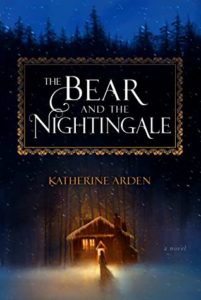 A Book Review of
A Book Review of
“The Bear and the Nightingale“, by Kathrine Arden
In the form of a medieval Russian folklore, the book tells a story about the clash between Christianity from Moscow and idolatry in the woods of northern Russia. Moscow is civilized, political, sublime, and publicly right; the forest of Lesnaya Zemlya is untamed, earthly, natural, and privately wrong.
One place that exemplifies this theme of antagonism is the murderous dynamics between the rusalka (water sprite), a magical creature living in the lake, sustained on the meat of her killing, and the priest Konstantin, who is exiled to the woods from Moscow because his rising influence among the locals has threatened the crown. The rusalka sees through the priest’s masquerading of piety and stoicism, and drools over his power-thirsty soul hidden underneath. For a rusalka, the flesh of men full of desire and fear provides the best nourishment. Without any knowledge of being targeted as a prey, the priest dreams about expanding his fame and glory in front of the village people, by exorcising demons and specters bred by the wild land. Despite their different interests and motivations, death is the wish they make upon each other.
Although animosity is felt by both parties, fear is incurred on only one side. Father Konstantin is scared of the wild, but the wild creatures are not deterred by him and his preach, even after they foresee the disastrous consequences his action is going to bring to the village. Rusalka tries to drown him, but her desire to kill is driven purely by a biological impulse.
The psychology of Father Konstantin is more complicated than simple fear. His attitude towards Vasya is always internally contradictory to the point of self-deception. He is attracted to and frightened by Vasya’s daring and vividness. He vilifies Vasya for her feral energy and defiant manners, calling her a devil, a beast, a witch, but cannot help falling for her charms. He is deeply entrenched in patriarchal beliefs, expecting women to please and breed under male orders, and he, as a member of the male class, feels morally entitled to punish any non-conforming members of the female class. He conspires with Vasya’s stepmother in sending Vasya to a convent, despite knowing being locked up in the convent will kill everything in this girl that intrigues him. He pities Vasya for she must lead a life that men like him force her to lead, and calls that fate the women’s fate. What a hypocrite and a coward of him, hidden under a mask of piety.
A centering theme of the book lies in the three-stage prophecy repeatedly told to Vasya, and to the readers: first comes fear, next fire, next famine. Why is fear the start of a series of disasters? I think this passage reveals some clue.
“God, thought Vasya, when the service haltingly renewed. Here? Chyerti cannot come into churches; they are creatures of this world, and church is for the next.”
What does the notion of “God” represent here? As the passage above suggests, God represents the next world, the life after this life. Fear for God is fear for death. Why is fear for death the beginning of self-destruction? In my opinion, it is because this fear is man-made, its origin illusional. When someone starts to see natural ways as sinful and death as punishment for sinning, she or he holds up illusions over the nature’s law.
The magical creatures do not fear death. They have an innate understanding of mortality, which is developed from living a life in accordance to the natural rhythms of growth and decay. —— Everything dies. Despite all his knowledge in Christianity and icon-creation, the priest is ignorant in critical matters — he does not understand life. He tries to subvert the law of nature and replace it with the authority of a man-made God. The reverence to a man-made God, accompanied by the irreverence to nature’s order, fuel the fear among villagers, empower the bear, and bring on destruction. The bear can only be bound by two things: the frost God Morozko in midwinter, when his power is at the peak, or a brave parent who is willing to sacrifice his life for his children. Only nature’s relentless showing of her power, or human’s brave confrontation can stop the foolish behavior of self-destruction.
The story is a beautiful folklore. It swims through magic waters, breathes the quaint air of a long medieval Russian winter. But it is also relevant to contemporary awarenesses and challenges. I see this story as a warning letter to the men’s insolence engendered by their ignorance, a celebration over the triumph of nature, a love song to the magic and glamor of wilderness, and a philosophical contemplation over the meaning of life and mortality.